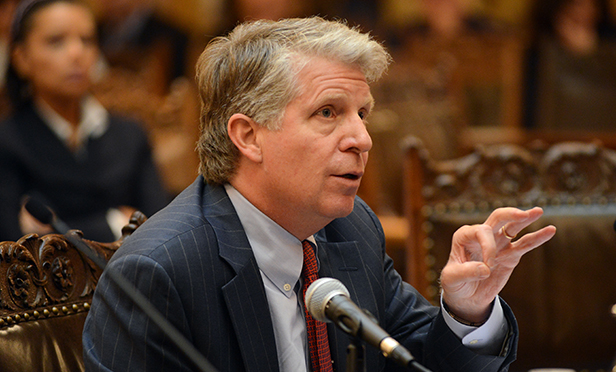Vance's Manafort Indictment Close to the Edge of NY's Double Jeopardy Cliff, Experts Say
The Manhattan DA's indictment of Trump's former campaign chairman is the first test of state prosecutors' attempts to steer clear of New York's double jeopardy law, while holding the president's former aides accountable in the event of a pardon.
March 15, 2019 at 05:46 PM
5 minute read
 Manhattan District Attorney Cyrus Vance Jr. Photo: Rick Kopstein/ALM
Manhattan District Attorney Cyrus Vance Jr. Photo: Rick Kopstein/ALM
Former prosecutors and academics are divided on Manhattan DA Cyrus Vance Jr.'s chances of success in avoiding New York's restrictive double jeopardy laws in his office's pursuit of former Trump campaign chairman Paul Manafort Jr.
Vance's decision to secure an indictment against Manafort was clear enough when it was announced just moments after the former Ukrainian lobbyist was sentenced to a total of seven and a half years in federal prison by U.S. district judges in the Eastern District of Virginia and the District of Columbia.
If President Donald Trump would choose to issue a pardon for Manafort, state prosecutors in New York want the ability to keep him in legal jeopardy without the ability for the president to interfere. Trump said this week that he has not at this time considered an offer of clemency to his ex-campaign manager.
But some state prosecutors and legal observers have publicly expressed concerns for months about New York's restrictive double jeopardy law and the impact it could have on state prosecutors' desire to hold members of the Trump administration, family or both to account down the road.
While lawmakers in Albany inch closer toward updating the law, observers are split on the path for Vance to take, as well as his office's chances of success.
New York Law School professor Rebecca Roiphe, who previously served in the Manhattan DA's office, said there are legitimate concerns that charges in the indictment could run afoul of the state's double jeopardy law.
“I don't think it's a slam-dunk case,” she told the Law Journal. “What the DA would have had to do is really thread the needle here and charge crimes and underlying facts that don't overlap with federal charges.”
It's unclear whether Vance has managed to do that, and, perhaps more importantly, whether a state judge will agree with prosecutors' arguments they have.
In the 16-count indictment, at least seven of the counts are related in some way to a fraudulent mortgage scheme Manafort is alleged to have orchestrated. According to reports, citing sources with knowledge of the situation, the charges relate to mortgages through Citizens Bank and Federal Savings Bank.
These same banks were identified in the federal bank fraud prosecution against Manafort, for which Manafort was found guilty of five counts of fraud, while a mistrial was declared on seven other counts of bank fraud and related conspiracy. Observers are concerned the state charges are related to the exact same underlying acts and offenses Manafort was charged with, and convicted of in some instances, in federal court.
The state statute does provide a number of exceptions to double jeopardy. Of the three most relevant to the current situation , the one eyed most closely by observers in the Vance indictment requires that the charged offenses contain some differentiating element, and the offense alleged violates a law designed “to prevent very different kinds of harm or evil.”
Saul Ewing Arnstein & Lehr partner Jennifer Beidel, a former assistant U.S. attorney in Manhattan, said one of the keys will be showing the differences between the state's mortgage fraud provisions and, say, a wire fraud charge that has an interstate wires element not found in the state statute.
“The question here is whether the state authorities have appropriately parsed the elements of the statutes that are charged in each case, and determined there is a different unique element to each charge,” she said. “If there is, they're probably fine. If there's not, they may not be.”
Exiger general counsel Daniel Alonso sees a way for Vance's office to be in the clear. The former chief assistant DA to Vance during his first term, Alonso sees the most likely path for the Manhattan DA's office lies with whatever lines up with the counts the jury hung on.
The convicted charges are the most problematic for state prosecutors, as Alonso noted. Here, Vance's office could make the argument that the state's mortgage fraud laws, drafted in the wake of the housing crisis of the last decade, are aimed to resolve a different harm than the federal bank statutes.
“The harm that the residential mortgage law was designed to attack was not bank fraud, but to preserve the integrity of mortgage system against fraud—that's the Manhattan DA's argument,” Alonso said, describing the hypothetical.
He pointed to the fact that the state's residential mortgage fraud law, unlike federal bank fraud, exempts from liability someone who lives in the property, even if they would otherwise be guilty.
Fordham University School of Law professor Jed Shugerman disagreed, saying he sees Vance's case as not only “weak,” but one that opens the door to questions about Vance and other state prosecutors' commitment to the rule of law.
“The indictment of Manafort for the Citizens Bank transaction certainly goes against the spirit of the New York law, and it probably goes against the letter of New York law,” said Shugerman, who wrote recently about the issue. “This is, on its face, as far as I read, a fairly clear double jeopardy problem. And unless there's some other set of facts, or some other set of precedents that I haven't seen, I have to wonder about the political wisdom and the ethics of pushing New York State's double jeopardy law this far.”
A spokesman for the DA's office declined to comment.
Related:
Manafort Indicted by Manhattan DA for Mortgage Fraud
NY Lawmakers Introduce New Language to Close 'Double Jeopardy Loophole'
This content has been archived. It is available through our partners, LexisNexis® and Bloomberg Law.
To view this content, please continue to their sites.
Not a Lexis Subscriber?
Subscribe Now
Not a Bloomberg Law Subscriber?
Subscribe Now
NOT FOR REPRINT
© 2025 ALM Global, LLC, All Rights Reserved. Request academic re-use from www.copyright.com. All other uses, submit a request to [email protected]. For more information visit Asset & Logo Licensing.
You Might Like
View All

Family Law Practitioners Weigh In on Court System's New Joint Divorce Program

Former NY City Hall Official Tied to Adams Corruption Probe to Plead Guilty

New Charges Expected in Sex Trafficking Case Against Broker Brothers
Trending Stories
- 1States Accuse Trump of Thwarting Court's Funding Restoration Order
- 2Microsoft Becomes Latest Tech Company to Face Claims of Stealing Marketing Commissions From Influencers
- 3Coral Gables Attorney Busted for Stalking Lawyer
- 4Trump's DOJ Delays Releasing Jan. 6 FBI Agents List Under Consent Order
- 5Securities Report Says That 2024 Settlements Passed a Total of $5.2B
Who Got The Work
J. Brugh Lower of Gibbons has entered an appearance for industrial equipment supplier Devco Corporation in a pending trademark infringement lawsuit. The suit, accusing the defendant of selling knock-off Graco products, was filed Dec. 18 in New Jersey District Court by Rivkin Radler on behalf of Graco Inc. and Graco Minnesota. The case, assigned to U.S. District Judge Zahid N. Quraishi, is 3:24-cv-11294, Graco Inc. et al v. Devco Corporation.
Who Got The Work
Rebecca Maller-Stein and Kent A. Yalowitz of Arnold & Porter Kaye Scholer have entered their appearances for Hanaco Venture Capital and its executives, Lior Prosor and David Frankel, in a pending securities lawsuit. The action, filed on Dec. 24 in New York Southern District Court by Zell, Aron & Co. on behalf of Goldeneye Advisors, accuses the defendants of negligently and fraudulently managing the plaintiff's $1 million investment. The case, assigned to U.S. District Judge Vernon S. Broderick, is 1:24-cv-09918, Goldeneye Advisors, LLC v. Hanaco Venture Capital, Ltd. et al.
Who Got The Work
Attorneys from A&O Shearman has stepped in as defense counsel for Toronto-Dominion Bank and other defendants in a pending securities class action. The suit, filed Dec. 11 in New York Southern District Court by Bleichmar Fonti & Auld, accuses the defendants of concealing the bank's 'pervasive' deficiencies in regards to its compliance with the Bank Secrecy Act and the quality of its anti-money laundering controls. The case, assigned to U.S. District Judge Arun Subramanian, is 1:24-cv-09445, Gonzalez v. The Toronto-Dominion Bank et al.
Who Got The Work
Crown Castle International, a Pennsylvania company providing shared communications infrastructure, has turned to Luke D. Wolf of Gordon Rees Scully Mansukhani to fend off a pending breach-of-contract lawsuit. The court action, filed Nov. 25 in Michigan Eastern District Court by Hooper Hathaway PC on behalf of The Town Residences LLC, accuses Crown Castle of failing to transfer approximately $30,000 in utility payments from T-Mobile in breach of a roof-top lease and assignment agreement. The case, assigned to U.S. District Judge Susan K. Declercq, is 2:24-cv-13131, The Town Residences LLC v. T-Mobile US, Inc. et al.
Who Got The Work
Wilfred P. Coronato and Daniel M. Schwartz of McCarter & English have stepped in as defense counsel to Electrolux Home Products Inc. in a pending product liability lawsuit. The court action, filed Nov. 26 in New York Eastern District Court by Poulos Lopiccolo PC and Nagel Rice LLP on behalf of David Stern, alleges that the defendant's refrigerators’ drawers and shelving repeatedly break and fall apart within months after purchase. The case, assigned to U.S. District Judge Joan M. Azrack, is 2:24-cv-08204, Stern v. Electrolux Home Products, Inc.
Featured Firms
Law Offices of Gary Martin Hays & Associates, P.C.
(470) 294-1674
Law Offices of Mark E. Salomone
(857) 444-6468
Smith & Hassler
(713) 739-1250






